Developing Manager: A Case Study of Jumeirah Carlton Tower Hotel
VerifiedAdded on 2024/05/30
|16
|4102
|180
AI Summary
This assignment explores the principles and practices of management behavior through a case study of Jumeirah Carlton Tower Hotel, a London-based 5-star hotel. It examines different management styles, leadership characteristics, communication processes, and organizational culture. The assignment also analyzes the potential of a developing manager, assessing their strengths, weaknesses, opportunities, and threats. It concludes with a career development plan outlining objectives and targets for personal and professional growth.
Contribute Materials
Your contribution can guide someone’s learning journey. Share your
documents today.
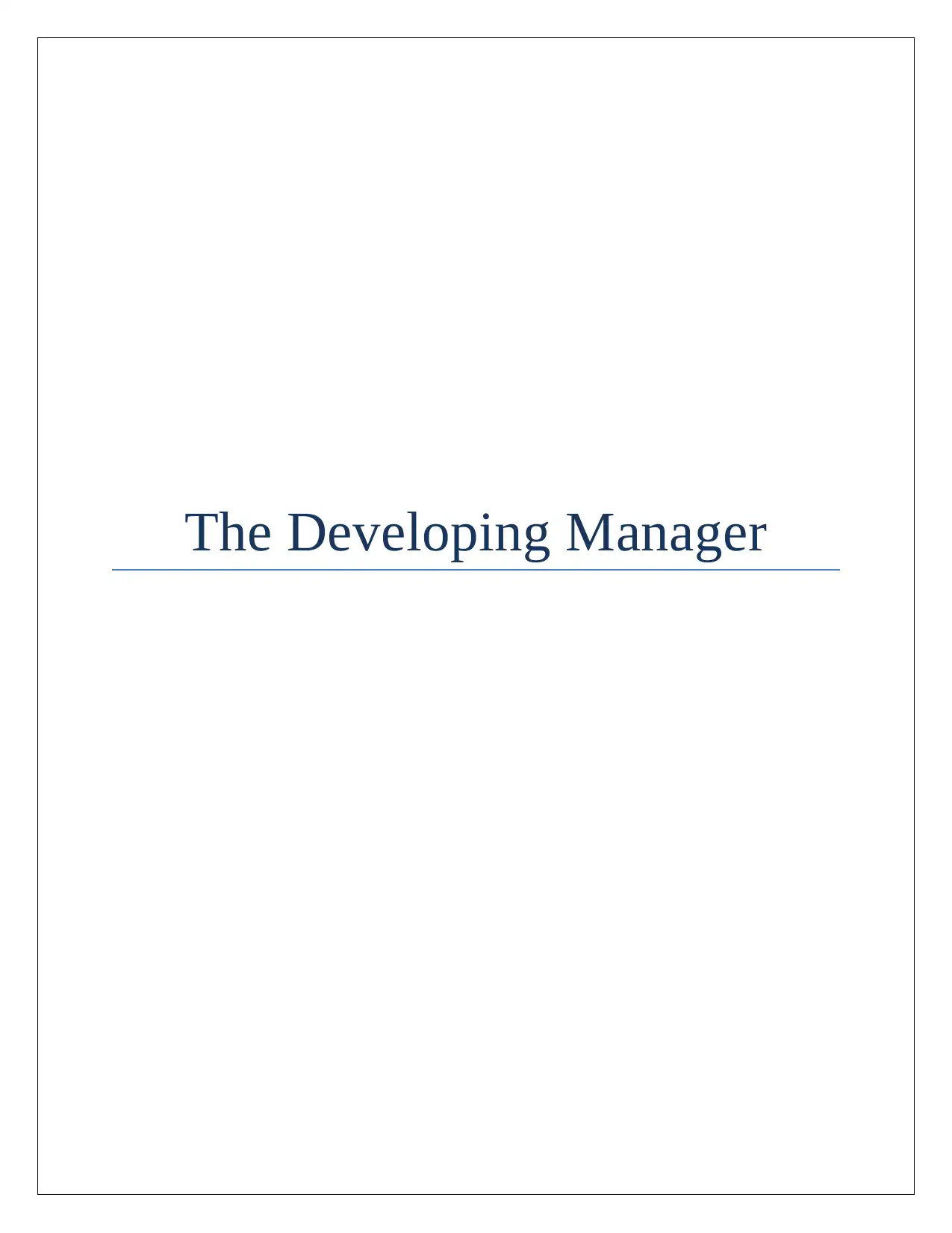
The Developing Manager
Secure Best Marks with AI Grader
Need help grading? Try our AI Grader for instant feedback on your assignments.
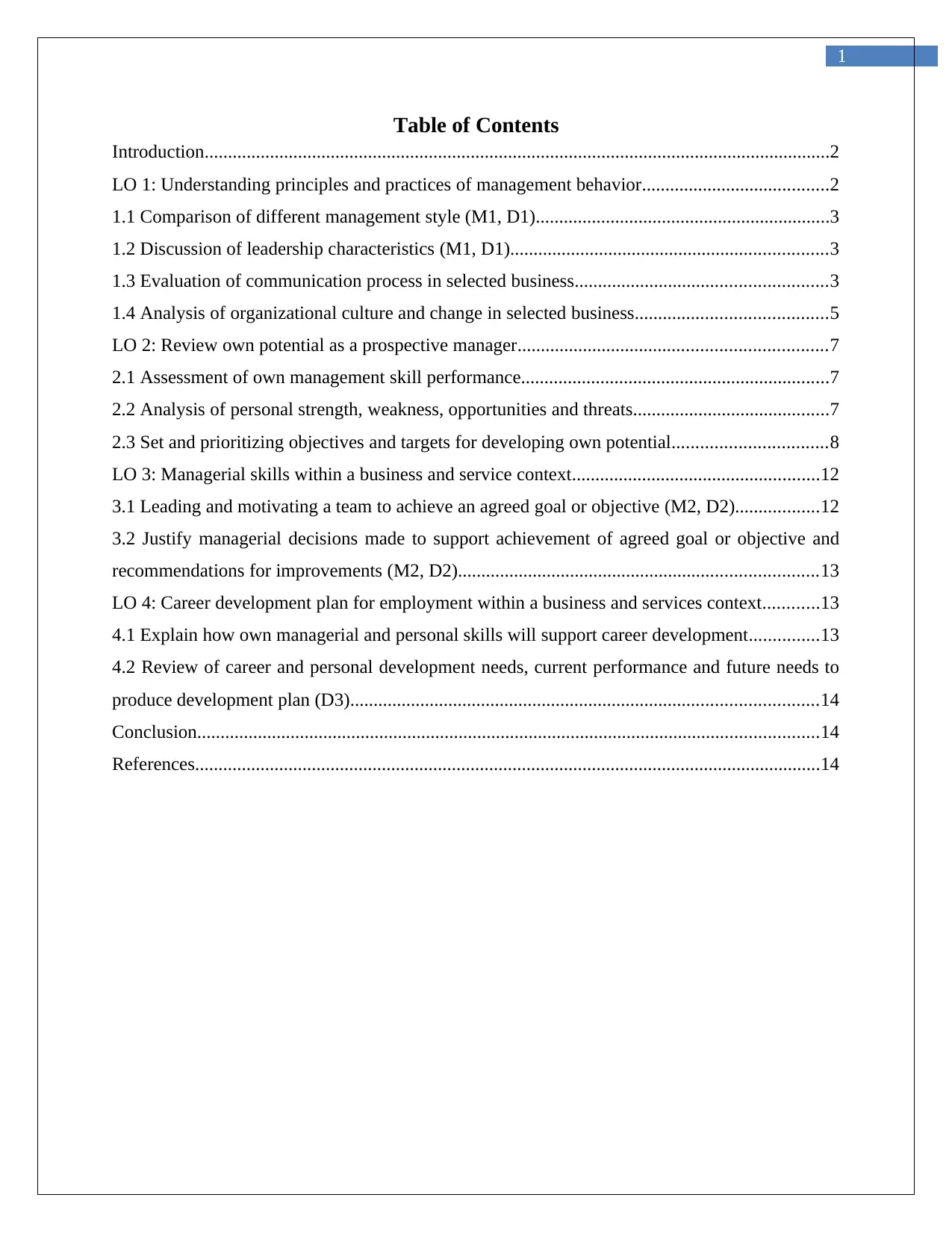
1
Table of Contents
Introduction......................................................................................................................................2
LO 1: Understanding principles and practices of management behavior........................................2
1.1 Comparison of different management style (M1, D1)...............................................................3
1.2 Discussion of leadership characteristics (M1, D1)....................................................................3
1.3 Evaluation of communication process in selected business......................................................3
1.4 Analysis of organizational culture and change in selected business.........................................5
LO 2: Review own potential as a prospective manager..................................................................7
2.1 Assessment of own management skill performance..................................................................7
2.2 Analysis of personal strength, weakness, opportunities and threats..........................................7
2.3 Set and prioritizing objectives and targets for developing own potential.................................8
LO 3: Managerial skills within a business and service context.....................................................12
3.1 Leading and motivating a team to achieve an agreed goal or objective (M2, D2)..................12
3.2 Justify managerial decisions made to support achievement of agreed goal or objective and
recommendations for improvements (M2, D2).............................................................................13
LO 4: Career development plan for employment within a business and services context............13
4.1 Explain how own managerial and personal skills will support career development...............13
4.2 Review of career and personal development needs, current performance and future needs to
produce development plan (D3)....................................................................................................14
Conclusion.....................................................................................................................................14
References......................................................................................................................................14
Table of Contents
Introduction......................................................................................................................................2
LO 1: Understanding principles and practices of management behavior........................................2
1.1 Comparison of different management style (M1, D1)...............................................................3
1.2 Discussion of leadership characteristics (M1, D1)....................................................................3
1.3 Evaluation of communication process in selected business......................................................3
1.4 Analysis of organizational culture and change in selected business.........................................5
LO 2: Review own potential as a prospective manager..................................................................7
2.1 Assessment of own management skill performance..................................................................7
2.2 Analysis of personal strength, weakness, opportunities and threats..........................................7
2.3 Set and prioritizing objectives and targets for developing own potential.................................8
LO 3: Managerial skills within a business and service context.....................................................12
3.1 Leading and motivating a team to achieve an agreed goal or objective (M2, D2)..................12
3.2 Justify managerial decisions made to support achievement of agreed goal or objective and
recommendations for improvements (M2, D2).............................................................................13
LO 4: Career development plan for employment within a business and services context............13
4.1 Explain how own managerial and personal skills will support career development...............13
4.2 Review of career and personal development needs, current performance and future needs to
produce development plan (D3)....................................................................................................14
Conclusion.....................................................................................................................................14
References......................................................................................................................................14
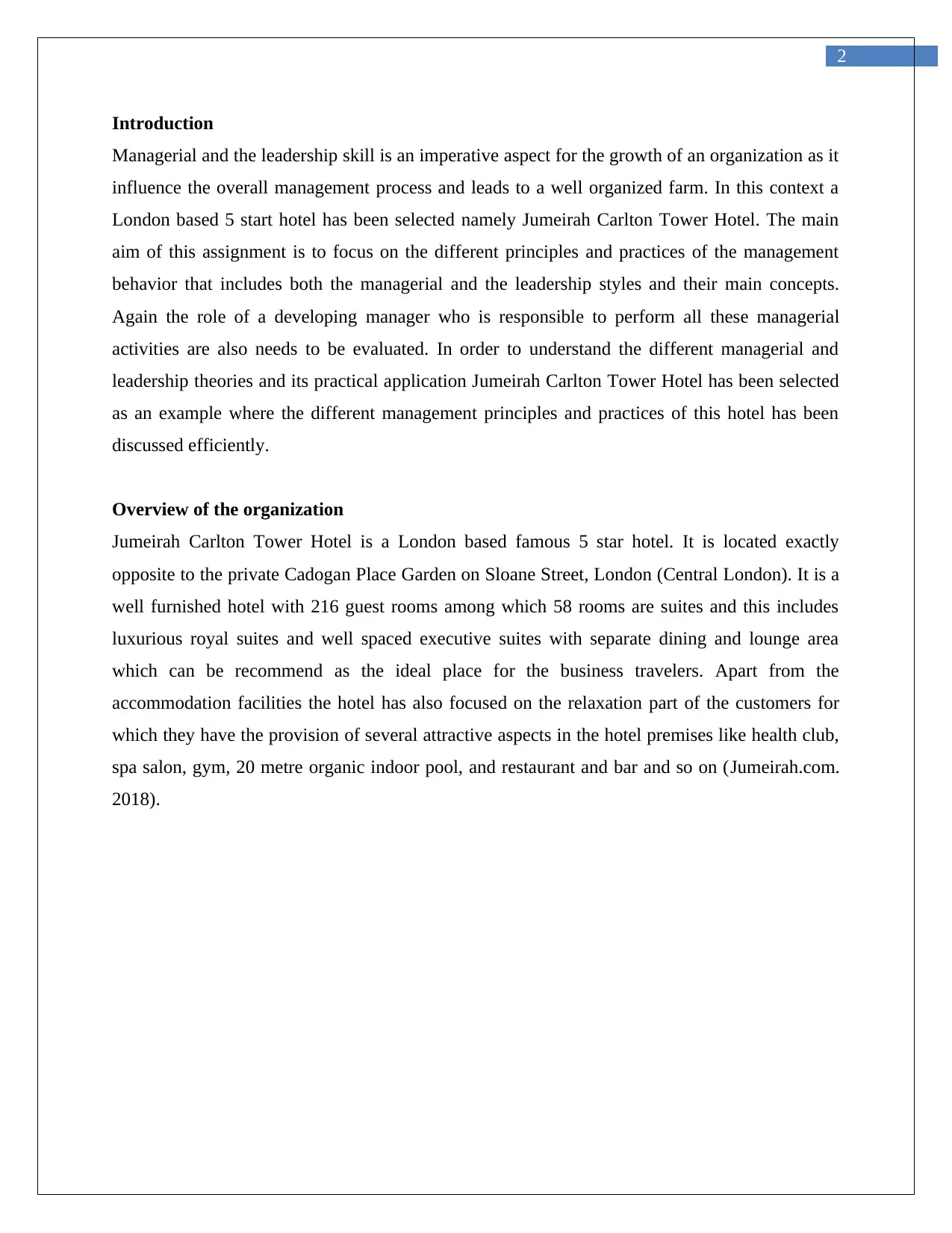
2
Introduction
Managerial and the leadership skill is an imperative aspect for the growth of an organization as it
influence the overall management process and leads to a well organized farm. In this context a
London based 5 start hotel has been selected namely Jumeirah Carlton Tower Hotel. The main
aim of this assignment is to focus on the different principles and practices of the management
behavior that includes both the managerial and the leadership styles and their main concepts.
Again the role of a developing manager who is responsible to perform all these managerial
activities are also needs to be evaluated. In order to understand the different managerial and
leadership theories and its practical application Jumeirah Carlton Tower Hotel has been selected
as an example where the different management principles and practices of this hotel has been
discussed efficiently.
Overview of the organization
Jumeirah Carlton Tower Hotel is a London based famous 5 star hotel. It is located exactly
opposite to the private Cadogan Place Garden on Sloane Street, London (Central London). It is a
well furnished hotel with 216 guest rooms among which 58 rooms are suites and this includes
luxurious royal suites and well spaced executive suites with separate dining and lounge area
which can be recommend as the ideal place for the business travelers. Apart from the
accommodation facilities the hotel has also focused on the relaxation part of the customers for
which they have the provision of several attractive aspects in the hotel premises like health club,
spa salon, gym, 20 metre organic indoor pool, and restaurant and bar and so on (Jumeirah.com.
2018).
Introduction
Managerial and the leadership skill is an imperative aspect for the growth of an organization as it
influence the overall management process and leads to a well organized farm. In this context a
London based 5 start hotel has been selected namely Jumeirah Carlton Tower Hotel. The main
aim of this assignment is to focus on the different principles and practices of the management
behavior that includes both the managerial and the leadership styles and their main concepts.
Again the role of a developing manager who is responsible to perform all these managerial
activities are also needs to be evaluated. In order to understand the different managerial and
leadership theories and its practical application Jumeirah Carlton Tower Hotel has been selected
as an example where the different management principles and practices of this hotel has been
discussed efficiently.
Overview of the organization
Jumeirah Carlton Tower Hotel is a London based famous 5 star hotel. It is located exactly
opposite to the private Cadogan Place Garden on Sloane Street, London (Central London). It is a
well furnished hotel with 216 guest rooms among which 58 rooms are suites and this includes
luxurious royal suites and well spaced executive suites with separate dining and lounge area
which can be recommend as the ideal place for the business travelers. Apart from the
accommodation facilities the hotel has also focused on the relaxation part of the customers for
which they have the provision of several attractive aspects in the hotel premises like health club,
spa salon, gym, 20 metre organic indoor pool, and restaurant and bar and so on (Jumeirah.com.
2018).
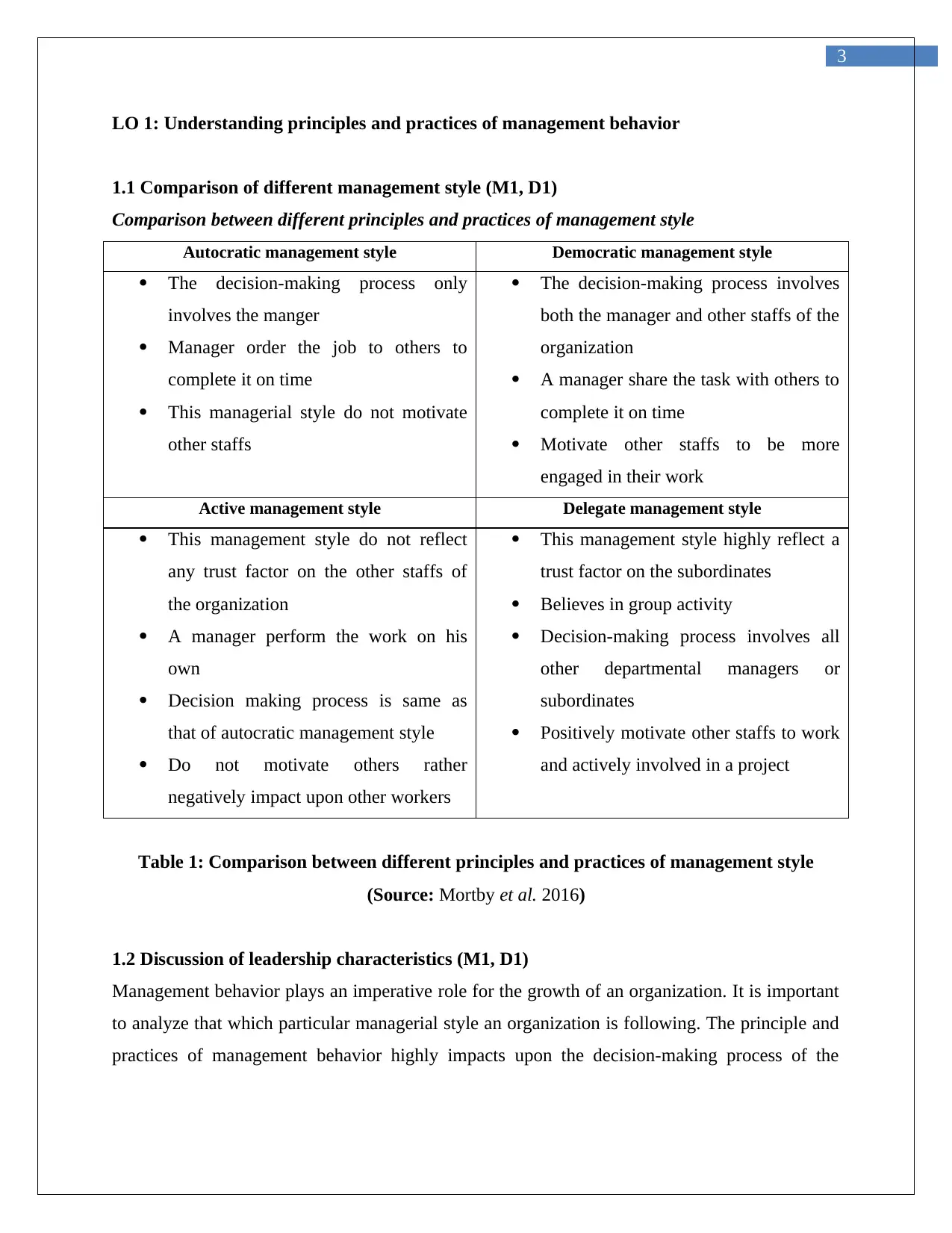
3
LO 1: Understanding principles and practices of management behavior
1.1 Comparison of different management style (M1, D1)
Comparison between different principles and practices of management style
Autocratic management style Democratic management style
The decision-making process only
involves the manger
Manager order the job to others to
complete it on time
This managerial style do not motivate
other staffs
The decision-making process involves
both the manager and other staffs of the
organization
A manager share the task with others to
complete it on time
Motivate other staffs to be more
engaged in their work
Active management style Delegate management style
This management style do not reflect
any trust factor on the other staffs of
the organization
A manager perform the work on his
own
Decision making process is same as
that of autocratic management style
Do not motivate others rather
negatively impact upon other workers
This management style highly reflect a
trust factor on the subordinates
Believes in group activity
Decision-making process involves all
other departmental managers or
subordinates
Positively motivate other staffs to work
and actively involved in a project
Table 1: Comparison between different principles and practices of management style
(Source: Mortby et al. 2016)
1.2 Discussion of leadership characteristics (M1, D1)
Management behavior plays an imperative role for the growth of an organization. It is important
to analyze that which particular managerial style an organization is following. The principle and
practices of management behavior highly impacts upon the decision-making process of the
LO 1: Understanding principles and practices of management behavior
1.1 Comparison of different management style (M1, D1)
Comparison between different principles and practices of management style
Autocratic management style Democratic management style
The decision-making process only
involves the manger
Manager order the job to others to
complete it on time
This managerial style do not motivate
other staffs
The decision-making process involves
both the manager and other staffs of the
organization
A manager share the task with others to
complete it on time
Motivate other staffs to be more
engaged in their work
Active management style Delegate management style
This management style do not reflect
any trust factor on the other staffs of
the organization
A manager perform the work on his
own
Decision making process is same as
that of autocratic management style
Do not motivate others rather
negatively impact upon other workers
This management style highly reflect a
trust factor on the subordinates
Believes in group activity
Decision-making process involves all
other departmental managers or
subordinates
Positively motivate other staffs to work
and actively involved in a project
Table 1: Comparison between different principles and practices of management style
(Source: Mortby et al. 2016)
1.2 Discussion of leadership characteristics (M1, D1)
Management behavior plays an imperative role for the growth of an organization. It is important
to analyze that which particular managerial style an organization is following. The principle and
practices of management behavior highly impacts upon the decision-making process of the
Secure Best Marks with AI Grader
Need help grading? Try our AI Grader for instant feedback on your assignments.
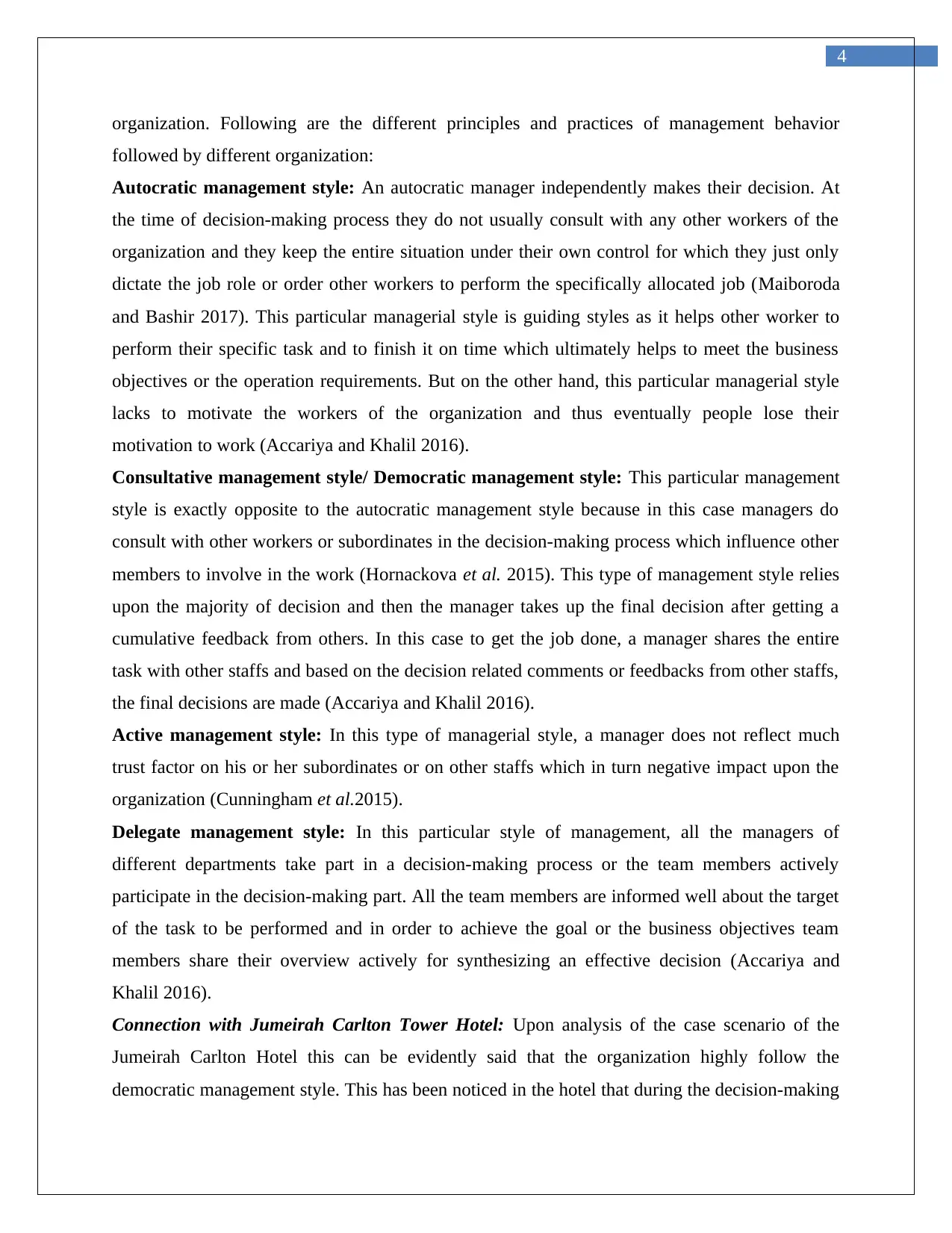
4
organization. Following are the different principles and practices of management behavior
followed by different organization:
Autocratic management style: An autocratic manager independently makes their decision. At
the time of decision-making process they do not usually consult with any other workers of the
organization and they keep the entire situation under their own control for which they just only
dictate the job role or order other workers to perform the specifically allocated job (Maiboroda
and Bashir 2017). This particular managerial style is guiding styles as it helps other worker to
perform their specific task and to finish it on time which ultimately helps to meet the business
objectives or the operation requirements. But on the other hand, this particular managerial style
lacks to motivate the workers of the organization and thus eventually people lose their
motivation to work (Accariya and Khalil 2016).
Consultative management style/ Democratic management style: This particular management
style is exactly opposite to the autocratic management style because in this case managers do
consult with other workers or subordinates in the decision-making process which influence other
members to involve in the work (Hornackova et al. 2015). This type of management style relies
upon the majority of decision and then the manager takes up the final decision after getting a
cumulative feedback from others. In this case to get the job done, a manager shares the entire
task with other staffs and based on the decision related comments or feedbacks from other staffs,
the final decisions are made (Accariya and Khalil 2016).
Active management style: In this type of managerial style, a manager does not reflect much
trust factor on his or her subordinates or on other staffs which in turn negative impact upon the
organization (Cunningham et al.2015).
Delegate management style: In this particular style of management, all the managers of
different departments take part in a decision-making process or the team members actively
participate in the decision-making part. All the team members are informed well about the target
of the task to be performed and in order to achieve the goal or the business objectives team
members share their overview actively for synthesizing an effective decision (Accariya and
Khalil 2016).
Connection with Jumeirah Carlton Tower Hotel: Upon analysis of the case scenario of the
Jumeirah Carlton Hotel this can be evidently said that the organization highly follow the
democratic management style. This has been noticed in the hotel that during the decision-making
organization. Following are the different principles and practices of management behavior
followed by different organization:
Autocratic management style: An autocratic manager independently makes their decision. At
the time of decision-making process they do not usually consult with any other workers of the
organization and they keep the entire situation under their own control for which they just only
dictate the job role or order other workers to perform the specifically allocated job (Maiboroda
and Bashir 2017). This particular managerial style is guiding styles as it helps other worker to
perform their specific task and to finish it on time which ultimately helps to meet the business
objectives or the operation requirements. But on the other hand, this particular managerial style
lacks to motivate the workers of the organization and thus eventually people lose their
motivation to work (Accariya and Khalil 2016).
Consultative management style/ Democratic management style: This particular management
style is exactly opposite to the autocratic management style because in this case managers do
consult with other workers or subordinates in the decision-making process which influence other
members to involve in the work (Hornackova et al. 2015). This type of management style relies
upon the majority of decision and then the manager takes up the final decision after getting a
cumulative feedback from others. In this case to get the job done, a manager shares the entire
task with other staffs and based on the decision related comments or feedbacks from other staffs,
the final decisions are made (Accariya and Khalil 2016).
Active management style: In this type of managerial style, a manager does not reflect much
trust factor on his or her subordinates or on other staffs which in turn negative impact upon the
organization (Cunningham et al.2015).
Delegate management style: In this particular style of management, all the managers of
different departments take part in a decision-making process or the team members actively
participate in the decision-making part. All the team members are informed well about the target
of the task to be performed and in order to achieve the goal or the business objectives team
members share their overview actively for synthesizing an effective decision (Accariya and
Khalil 2016).
Connection with Jumeirah Carlton Tower Hotel: Upon analysis of the case scenario of the
Jumeirah Carlton Hotel this can be evidently said that the organization highly follow the
democratic management style. This has been noticed in the hotel that during the decision-making
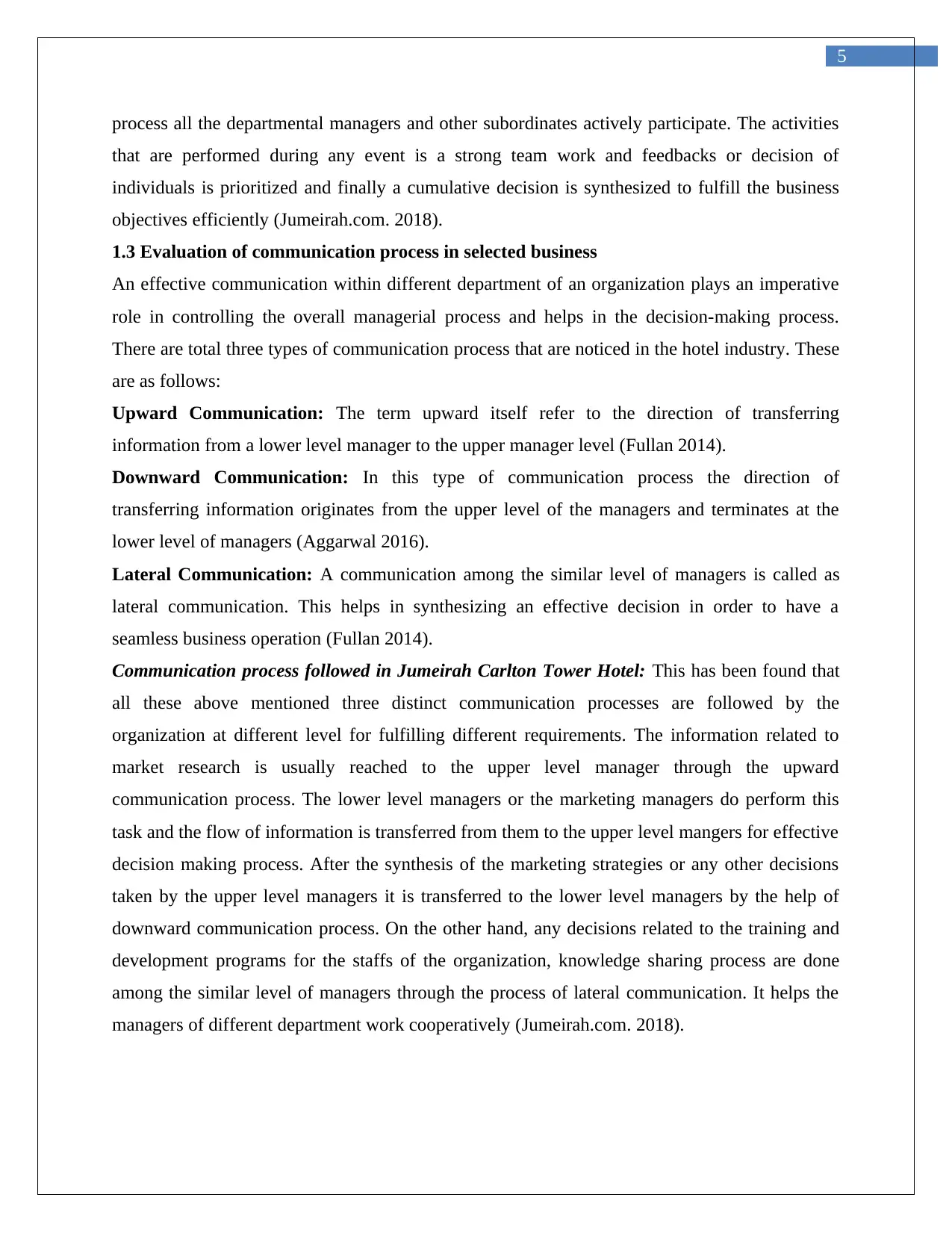
5
process all the departmental managers and other subordinates actively participate. The activities
that are performed during any event is a strong team work and feedbacks or decision of
individuals is prioritized and finally a cumulative decision is synthesized to fulfill the business
objectives efficiently (Jumeirah.com. 2018).
1.3 Evaluation of communication process in selected business
An effective communication within different department of an organization plays an imperative
role in controlling the overall managerial process and helps in the decision-making process.
There are total three types of communication process that are noticed in the hotel industry. These
are as follows:
Upward Communication: The term upward itself refer to the direction of transferring
information from a lower level manager to the upper manager level (Fullan 2014).
Downward Communication: In this type of communication process the direction of
transferring information originates from the upper level of the managers and terminates at the
lower level of managers (Aggarwal 2016).
Lateral Communication: A communication among the similar level of managers is called as
lateral communication. This helps in synthesizing an effective decision in order to have a
seamless business operation (Fullan 2014).
Communication process followed in Jumeirah Carlton Tower Hotel: This has been found that
all these above mentioned three distinct communication processes are followed by the
organization at different level for fulfilling different requirements. The information related to
market research is usually reached to the upper level manager through the upward
communication process. The lower level managers or the marketing managers do perform this
task and the flow of information is transferred from them to the upper level mangers for effective
decision making process. After the synthesis of the marketing strategies or any other decisions
taken by the upper level managers it is transferred to the lower level managers by the help of
downward communication process. On the other hand, any decisions related to the training and
development programs for the staffs of the organization, knowledge sharing process are done
among the similar level of managers through the process of lateral communication. It helps the
managers of different department work cooperatively (Jumeirah.com. 2018).
process all the departmental managers and other subordinates actively participate. The activities
that are performed during any event is a strong team work and feedbacks or decision of
individuals is prioritized and finally a cumulative decision is synthesized to fulfill the business
objectives efficiently (Jumeirah.com. 2018).
1.3 Evaluation of communication process in selected business
An effective communication within different department of an organization plays an imperative
role in controlling the overall managerial process and helps in the decision-making process.
There are total three types of communication process that are noticed in the hotel industry. These
are as follows:
Upward Communication: The term upward itself refer to the direction of transferring
information from a lower level manager to the upper manager level (Fullan 2014).
Downward Communication: In this type of communication process the direction of
transferring information originates from the upper level of the managers and terminates at the
lower level of managers (Aggarwal 2016).
Lateral Communication: A communication among the similar level of managers is called as
lateral communication. This helps in synthesizing an effective decision in order to have a
seamless business operation (Fullan 2014).
Communication process followed in Jumeirah Carlton Tower Hotel: This has been found that
all these above mentioned three distinct communication processes are followed by the
organization at different level for fulfilling different requirements. The information related to
market research is usually reached to the upper level manager through the upward
communication process. The lower level managers or the marketing managers do perform this
task and the flow of information is transferred from them to the upper level mangers for effective
decision making process. After the synthesis of the marketing strategies or any other decisions
taken by the upper level managers it is transferred to the lower level managers by the help of
downward communication process. On the other hand, any decisions related to the training and
development programs for the staffs of the organization, knowledge sharing process are done
among the similar level of managers through the process of lateral communication. It helps the
managers of different department work cooperatively (Jumeirah.com. 2018).
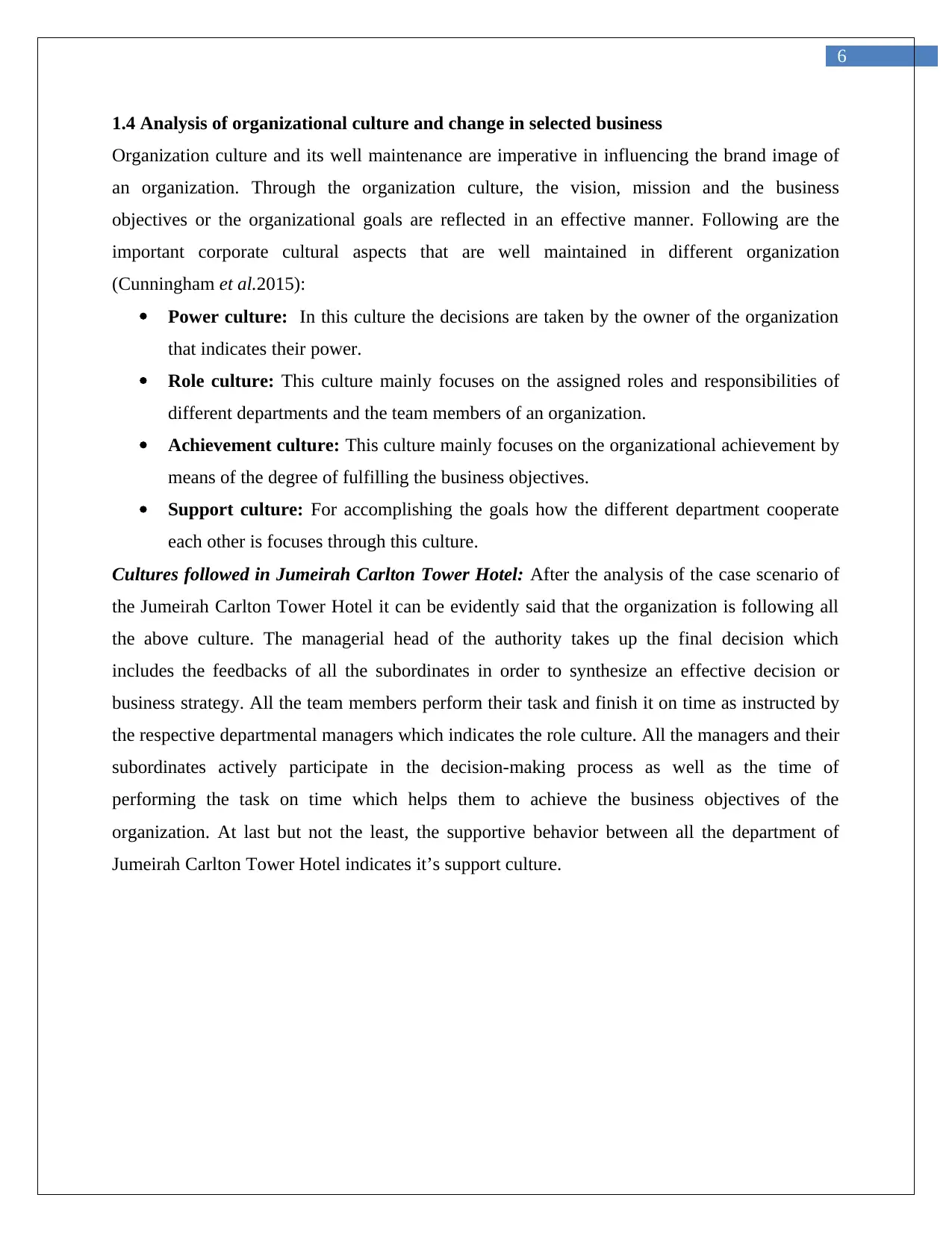
6
1.4 Analysis of organizational culture and change in selected business
Organization culture and its well maintenance are imperative in influencing the brand image of
an organization. Through the organization culture, the vision, mission and the business
objectives or the organizational goals are reflected in an effective manner. Following are the
important corporate cultural aspects that are well maintained in different organization
(Cunningham et al.2015):
Power culture: In this culture the decisions are taken by the owner of the organization
that indicates their power.
Role culture: This culture mainly focuses on the assigned roles and responsibilities of
different departments and the team members of an organization.
Achievement culture: This culture mainly focuses on the organizational achievement by
means of the degree of fulfilling the business objectives.
Support culture: For accomplishing the goals how the different department cooperate
each other is focuses through this culture.
Cultures followed in Jumeirah Carlton Tower Hotel: After the analysis of the case scenario of
the Jumeirah Carlton Tower Hotel it can be evidently said that the organization is following all
the above culture. The managerial head of the authority takes up the final decision which
includes the feedbacks of all the subordinates in order to synthesize an effective decision or
business strategy. All the team members perform their task and finish it on time as instructed by
the respective departmental managers which indicates the role culture. All the managers and their
subordinates actively participate in the decision-making process as well as the time of
performing the task on time which helps them to achieve the business objectives of the
organization. At last but not the least, the supportive behavior between all the department of
Jumeirah Carlton Tower Hotel indicates it’s support culture.
1.4 Analysis of organizational culture and change in selected business
Organization culture and its well maintenance are imperative in influencing the brand image of
an organization. Through the organization culture, the vision, mission and the business
objectives or the organizational goals are reflected in an effective manner. Following are the
important corporate cultural aspects that are well maintained in different organization
(Cunningham et al.2015):
Power culture: In this culture the decisions are taken by the owner of the organization
that indicates their power.
Role culture: This culture mainly focuses on the assigned roles and responsibilities of
different departments and the team members of an organization.
Achievement culture: This culture mainly focuses on the organizational achievement by
means of the degree of fulfilling the business objectives.
Support culture: For accomplishing the goals how the different department cooperate
each other is focuses through this culture.
Cultures followed in Jumeirah Carlton Tower Hotel: After the analysis of the case scenario of
the Jumeirah Carlton Tower Hotel it can be evidently said that the organization is following all
the above culture. The managerial head of the authority takes up the final decision which
includes the feedbacks of all the subordinates in order to synthesize an effective decision or
business strategy. All the team members perform their task and finish it on time as instructed by
the respective departmental managers which indicates the role culture. All the managers and their
subordinates actively participate in the decision-making process as well as the time of
performing the task on time which helps them to achieve the business objectives of the
organization. At last but not the least, the supportive behavior between all the department of
Jumeirah Carlton Tower Hotel indicates it’s support culture.
Paraphrase This Document
Need a fresh take? Get an instant paraphrase of this document with our AI Paraphraser
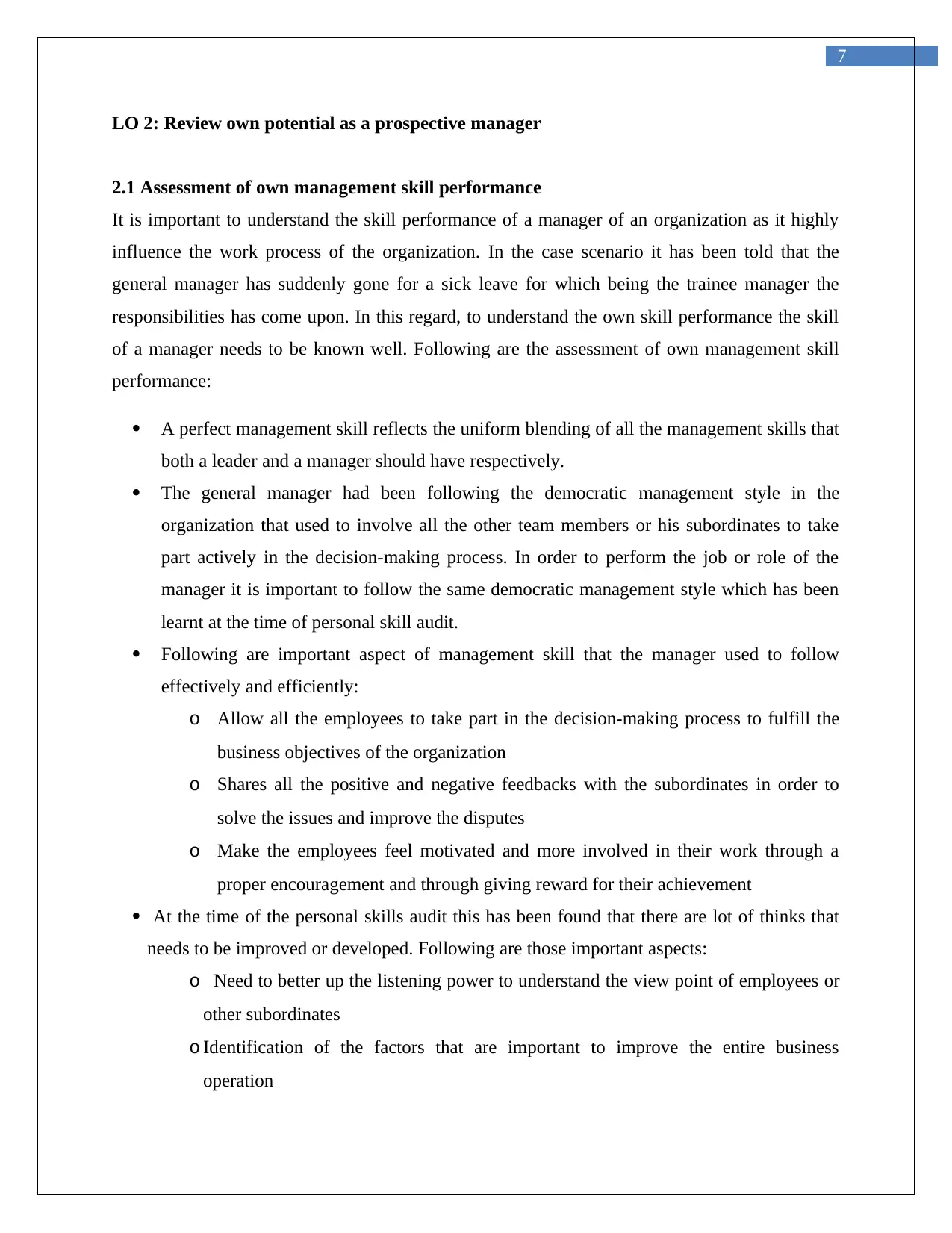
7
LO 2: Review own potential as a prospective manager
2.1 Assessment of own management skill performance
It is important to understand the skill performance of a manager of an organization as it highly
influence the work process of the organization. In the case scenario it has been told that the
general manager has suddenly gone for a sick leave for which being the trainee manager the
responsibilities has come upon. In this regard, to understand the own skill performance the skill
of a manager needs to be known well. Following are the assessment of own management skill
performance:
A perfect management skill reflects the uniform blending of all the management skills that
both a leader and a manager should have respectively.
The general manager had been following the democratic management style in the
organization that used to involve all the other team members or his subordinates to take
part actively in the decision-making process. In order to perform the job or role of the
manager it is important to follow the same democratic management style which has been
learnt at the time of personal skill audit.
Following are important aspect of management skill that the manager used to follow
effectively and efficiently:
o Allow all the employees to take part in the decision-making process to fulfill the
business objectives of the organization
o Shares all the positive and negative feedbacks with the subordinates in order to
solve the issues and improve the disputes
o Make the employees feel motivated and more involved in their work through a
proper encouragement and through giving reward for their achievement
At the time of the personal skills audit this has been found that there are lot of thinks that
needs to be improved or developed. Following are those important aspects:
o Need to better up the listening power to understand the view point of employees or
other subordinates
o Identification of the factors that are important to improve the entire business
operation
LO 2: Review own potential as a prospective manager
2.1 Assessment of own management skill performance
It is important to understand the skill performance of a manager of an organization as it highly
influence the work process of the organization. In the case scenario it has been told that the
general manager has suddenly gone for a sick leave for which being the trainee manager the
responsibilities has come upon. In this regard, to understand the own skill performance the skill
of a manager needs to be known well. Following are the assessment of own management skill
performance:
A perfect management skill reflects the uniform blending of all the management skills that
both a leader and a manager should have respectively.
The general manager had been following the democratic management style in the
organization that used to involve all the other team members or his subordinates to take
part actively in the decision-making process. In order to perform the job or role of the
manager it is important to follow the same democratic management style which has been
learnt at the time of personal skill audit.
Following are important aspect of management skill that the manager used to follow
effectively and efficiently:
o Allow all the employees to take part in the decision-making process to fulfill the
business objectives of the organization
o Shares all the positive and negative feedbacks with the subordinates in order to
solve the issues and improve the disputes
o Make the employees feel motivated and more involved in their work through a
proper encouragement and through giving reward for their achievement
At the time of the personal skills audit this has been found that there are lot of thinks that
needs to be improved or developed. Following are those important aspects:
o Need to better up the listening power to understand the view point of employees or
other subordinates
o Identification of the factors that are important to improve the entire business
operation
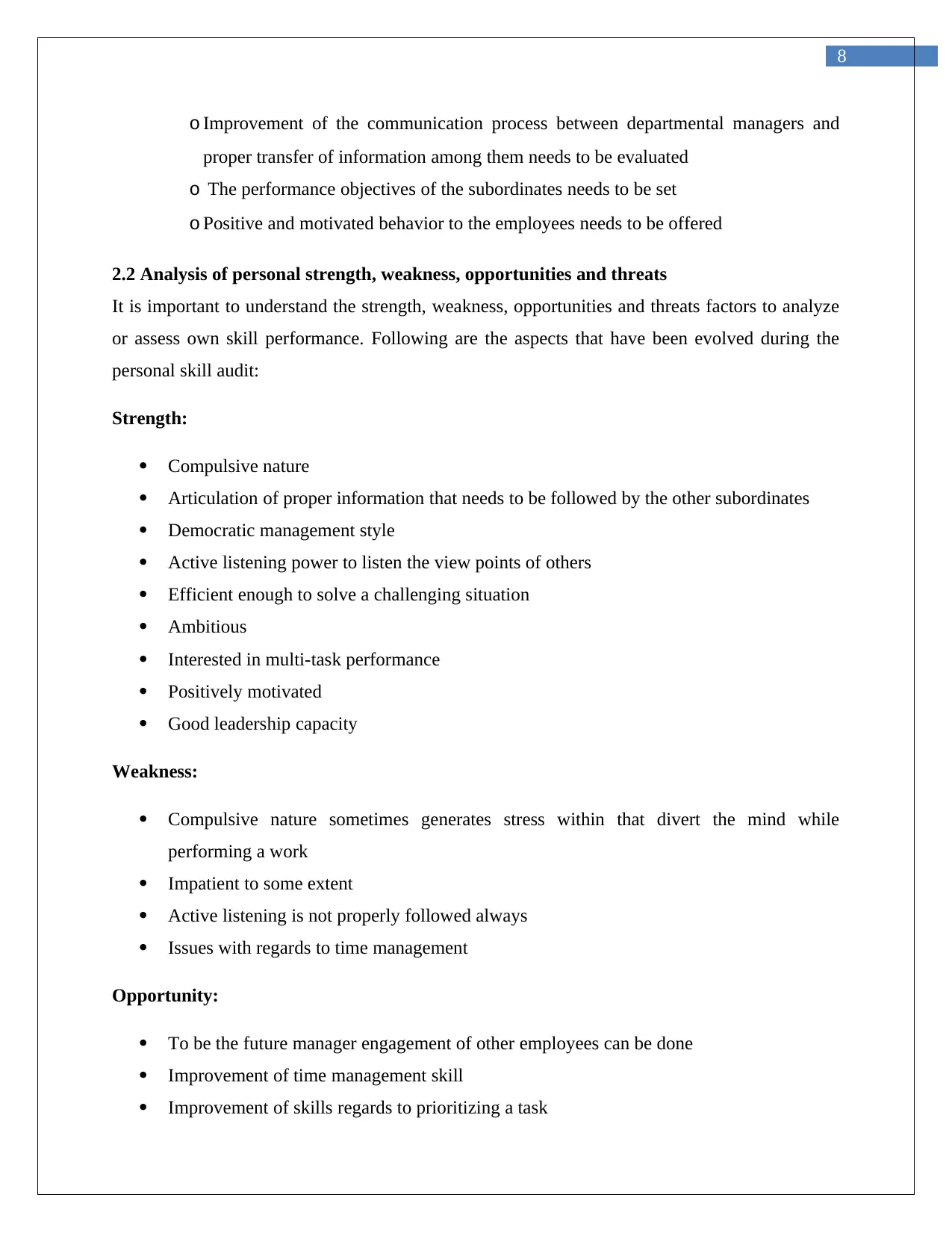
8
o Improvement of the communication process between departmental managers and
proper transfer of information among them needs to be evaluated
o The performance objectives of the subordinates needs to be set
o Positive and motivated behavior to the employees needs to be offered
2.2 Analysis of personal strength, weakness, opportunities and threats
It is important to understand the strength, weakness, opportunities and threats factors to analyze
or assess own skill performance. Following are the aspects that have been evolved during the
personal skill audit:
Strength:
Compulsive nature
Articulation of proper information that needs to be followed by the other subordinates
Democratic management style
Active listening power to listen the view points of others
Efficient enough to solve a challenging situation
Ambitious
Interested in multi-task performance
Positively motivated
Good leadership capacity
Weakness:
Compulsive nature sometimes generates stress within that divert the mind while
performing a work
Impatient to some extent
Active listening is not properly followed always
Issues with regards to time management
Opportunity:
To be the future manager engagement of other employees can be done
Improvement of time management skill
Improvement of skills regards to prioritizing a task
o Improvement of the communication process between departmental managers and
proper transfer of information among them needs to be evaluated
o The performance objectives of the subordinates needs to be set
o Positive and motivated behavior to the employees needs to be offered
2.2 Analysis of personal strength, weakness, opportunities and threats
It is important to understand the strength, weakness, opportunities and threats factors to analyze
or assess own skill performance. Following are the aspects that have been evolved during the
personal skill audit:
Strength:
Compulsive nature
Articulation of proper information that needs to be followed by the other subordinates
Democratic management style
Active listening power to listen the view points of others
Efficient enough to solve a challenging situation
Ambitious
Interested in multi-task performance
Positively motivated
Good leadership capacity
Weakness:
Compulsive nature sometimes generates stress within that divert the mind while
performing a work
Impatient to some extent
Active listening is not properly followed always
Issues with regards to time management
Opportunity:
To be the future manager engagement of other employees can be done
Improvement of time management skill
Improvement of skills regards to prioritizing a task
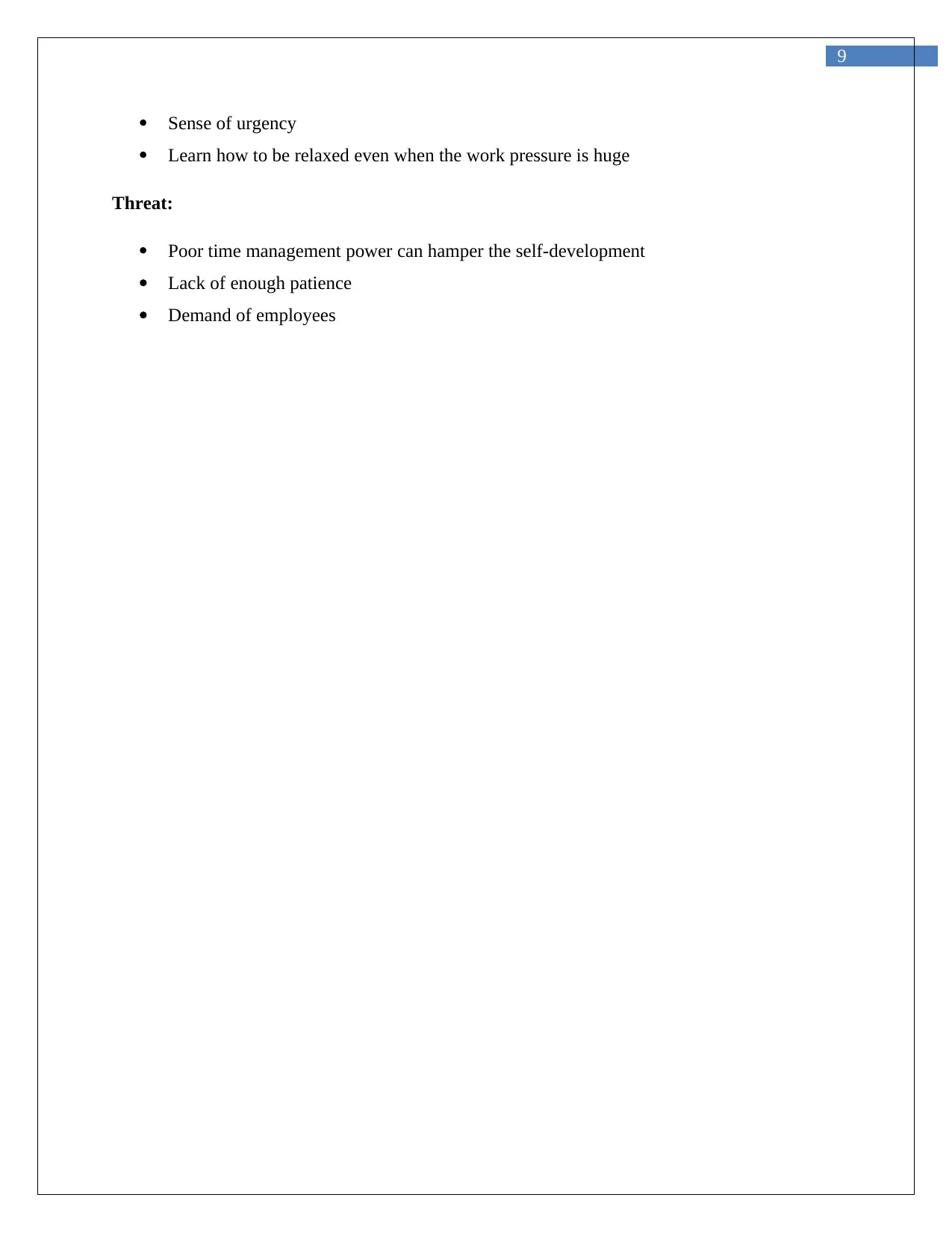
9
Sense of urgency
Learn how to be relaxed even when the work pressure is huge
Threat:
Poor time management power can hamper the self-development
Lack of enough patience
Demand of employees
Sense of urgency
Learn how to be relaxed even when the work pressure is huge
Threat:
Poor time management power can hamper the self-development
Lack of enough patience
Demand of employees
Secure Best Marks with AI Grader
Need help grading? Try our AI Grader for instant feedback on your assignments.
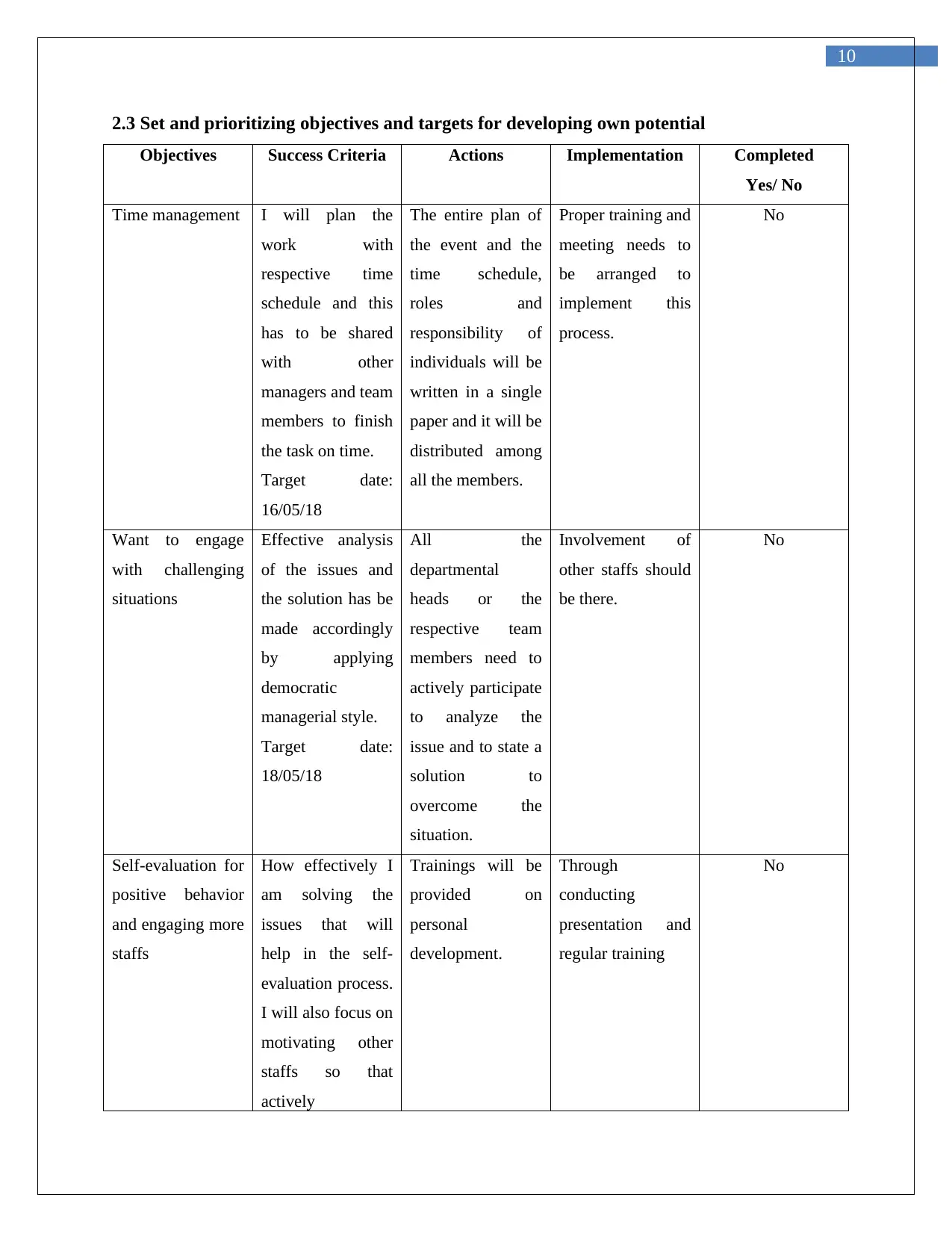
10
2.3 Set and prioritizing objectives and targets for developing own potential
Objectives Success Criteria Actions Implementation Completed
Yes/ No
Time management I will plan the
work with
respective time
schedule and this
has to be shared
with other
managers and team
members to finish
the task on time.
Target date:
16/05/18
The entire plan of
the event and the
time schedule,
roles and
responsibility of
individuals will be
written in a single
paper and it will be
distributed among
all the members.
Proper training and
meeting needs to
be arranged to
implement this
process.
No
Want to engage
with challenging
situations
Effective analysis
of the issues and
the solution has be
made accordingly
by applying
democratic
managerial style.
Target date:
18/05/18
All the
departmental
heads or the
respective team
members need to
actively participate
to analyze the
issue and to state a
solution to
overcome the
situation.
Involvement of
other staffs should
be there.
No
Self-evaluation for
positive behavior
and engaging more
staffs
How effectively I
am solving the
issues that will
help in the self-
evaluation process.
I will also focus on
motivating other
staffs so that
actively
Trainings will be
provided on
personal
development.
Through
conducting
presentation and
regular training
No
2.3 Set and prioritizing objectives and targets for developing own potential
Objectives Success Criteria Actions Implementation Completed
Yes/ No
Time management I will plan the
work with
respective time
schedule and this
has to be shared
with other
managers and team
members to finish
the task on time.
Target date:
16/05/18
The entire plan of
the event and the
time schedule,
roles and
responsibility of
individuals will be
written in a single
paper and it will be
distributed among
all the members.
Proper training and
meeting needs to
be arranged to
implement this
process.
No
Want to engage
with challenging
situations
Effective analysis
of the issues and
the solution has be
made accordingly
by applying
democratic
managerial style.
Target date:
18/05/18
All the
departmental
heads or the
respective team
members need to
actively participate
to analyze the
issue and to state a
solution to
overcome the
situation.
Involvement of
other staffs should
be there.
No
Self-evaluation for
positive behavior
and engaging more
staffs
How effectively I
am solving the
issues that will
help in the self-
evaluation process.
I will also focus on
motivating other
staffs so that
actively
Trainings will be
provided on
personal
development.
Through
conducting
presentation and
regular training
No
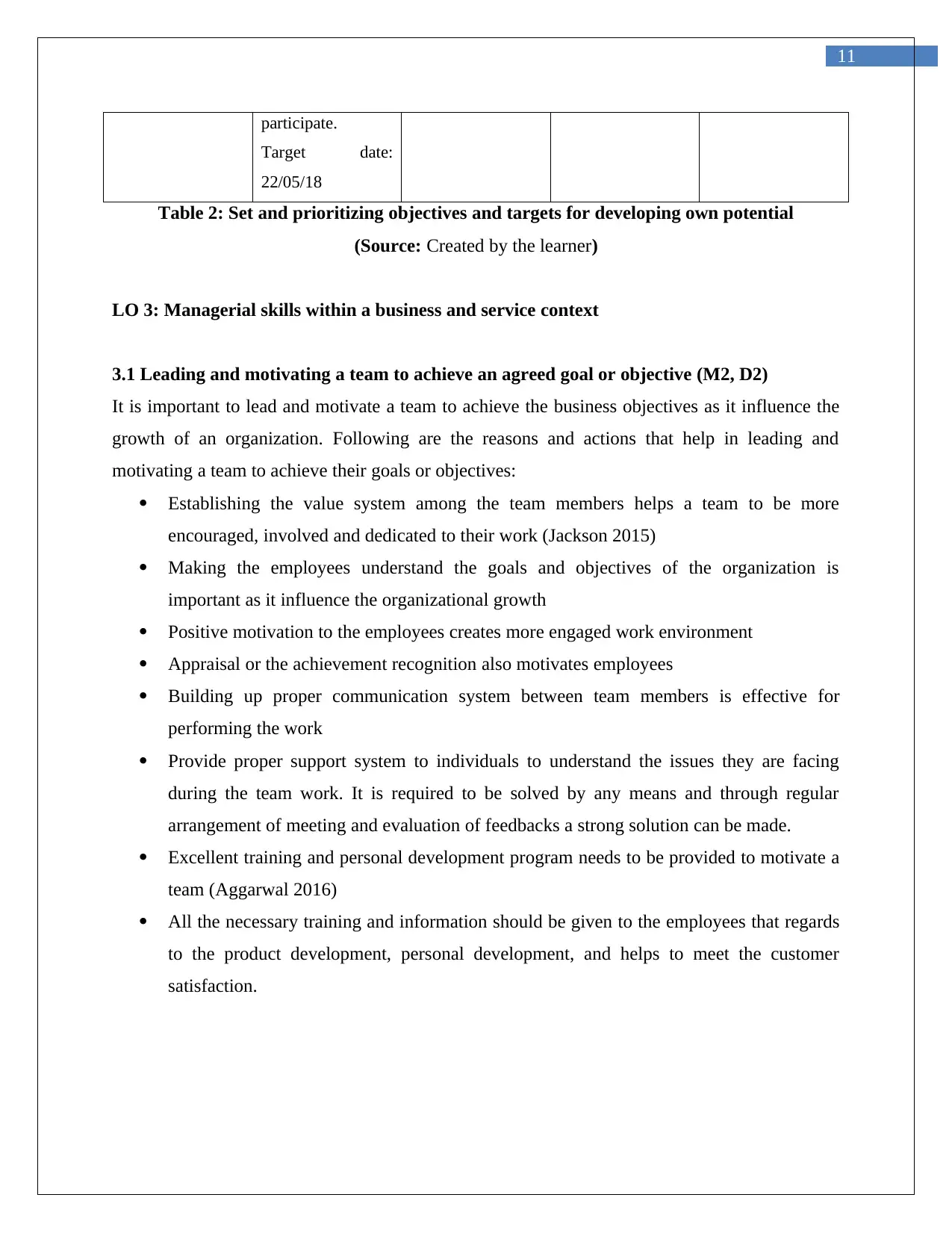
11
participate.
Target date:
22/05/18
Table 2: Set and prioritizing objectives and targets for developing own potential
(Source: Created by the learner)
LO 3: Managerial skills within a business and service context
3.1 Leading and motivating a team to achieve an agreed goal or objective (M2, D2)
It is important to lead and motivate a team to achieve the business objectives as it influence the
growth of an organization. Following are the reasons and actions that help in leading and
motivating a team to achieve their goals or objectives:
Establishing the value system among the team members helps a team to be more
encouraged, involved and dedicated to their work (Jackson 2015)
Making the employees understand the goals and objectives of the organization is
important as it influence the organizational growth
Positive motivation to the employees creates more engaged work environment
Appraisal or the achievement recognition also motivates employees
Building up proper communication system between team members is effective for
performing the work
Provide proper support system to individuals to understand the issues they are facing
during the team work. It is required to be solved by any means and through regular
arrangement of meeting and evaluation of feedbacks a strong solution can be made.
Excellent training and personal development program needs to be provided to motivate a
team (Aggarwal 2016)
All the necessary training and information should be given to the employees that regards
to the product development, personal development, and helps to meet the customer
satisfaction.
participate.
Target date:
22/05/18
Table 2: Set and prioritizing objectives and targets for developing own potential
(Source: Created by the learner)
LO 3: Managerial skills within a business and service context
3.1 Leading and motivating a team to achieve an agreed goal or objective (M2, D2)
It is important to lead and motivate a team to achieve the business objectives as it influence the
growth of an organization. Following are the reasons and actions that help in leading and
motivating a team to achieve their goals or objectives:
Establishing the value system among the team members helps a team to be more
encouraged, involved and dedicated to their work (Jackson 2015)
Making the employees understand the goals and objectives of the organization is
important as it influence the organizational growth
Positive motivation to the employees creates more engaged work environment
Appraisal or the achievement recognition also motivates employees
Building up proper communication system between team members is effective for
performing the work
Provide proper support system to individuals to understand the issues they are facing
during the team work. It is required to be solved by any means and through regular
arrangement of meeting and evaluation of feedbacks a strong solution can be made.
Excellent training and personal development program needs to be provided to motivate a
team (Aggarwal 2016)
All the necessary training and information should be given to the employees that regards
to the product development, personal development, and helps to meet the customer
satisfaction.
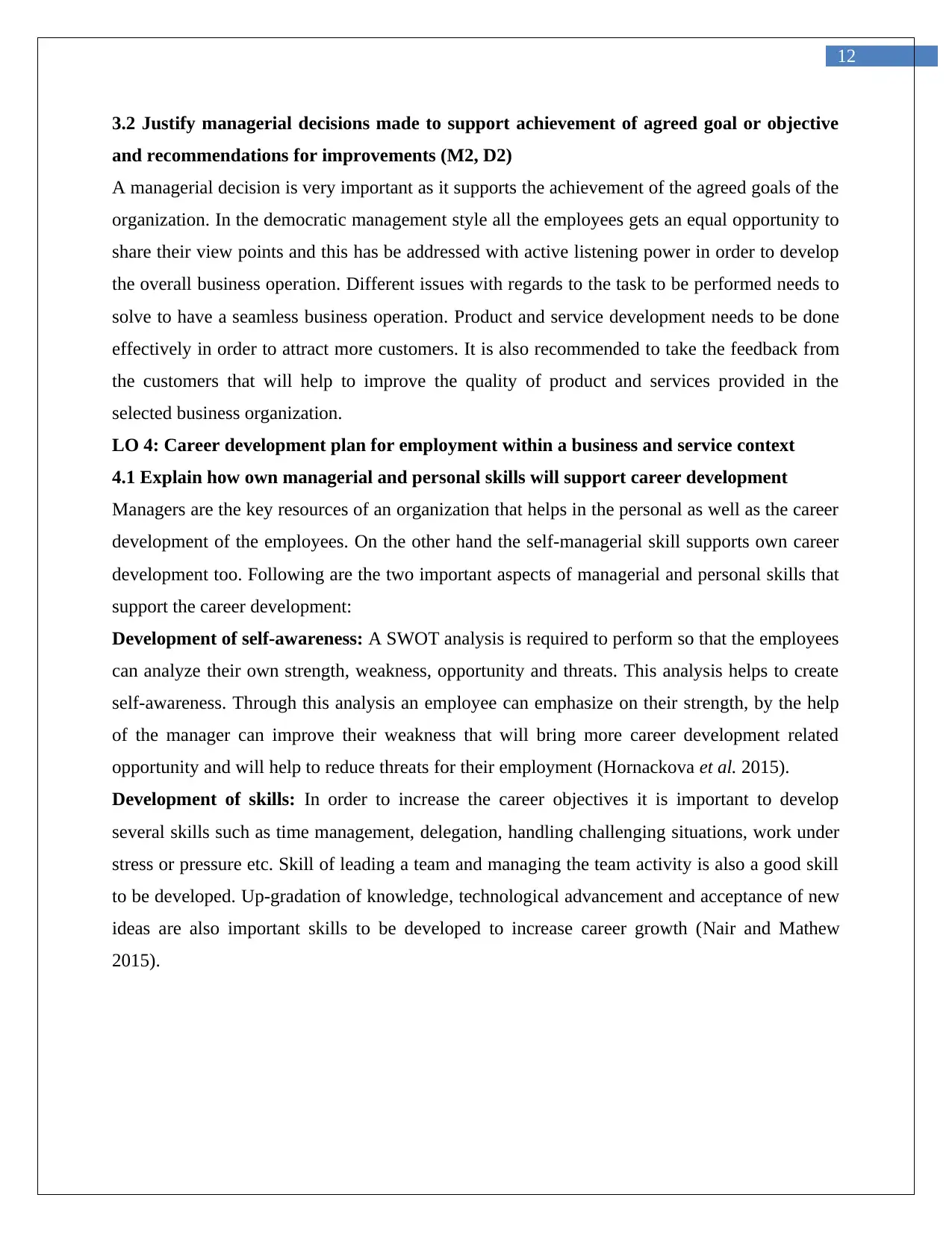
12
3.2 Justify managerial decisions made to support achievement of agreed goal or objective
and recommendations for improvements (M2, D2)
A managerial decision is very important as it supports the achievement of the agreed goals of the
organization. In the democratic management style all the employees gets an equal opportunity to
share their view points and this has be addressed with active listening power in order to develop
the overall business operation. Different issues with regards to the task to be performed needs to
solve to have a seamless business operation. Product and service development needs to be done
effectively in order to attract more customers. It is also recommended to take the feedback from
the customers that will help to improve the quality of product and services provided in the
selected business organization.
LO 4: Career development plan for employment within a business and service context
4.1 Explain how own managerial and personal skills will support career development
Managers are the key resources of an organization that helps in the personal as well as the career
development of the employees. On the other hand the self-managerial skill supports own career
development too. Following are the two important aspects of managerial and personal skills that
support the career development:
Development of self-awareness: A SWOT analysis is required to perform so that the employees
can analyze their own strength, weakness, opportunity and threats. This analysis helps to create
self-awareness. Through this analysis an employee can emphasize on their strength, by the help
of the manager can improve their weakness that will bring more career development related
opportunity and will help to reduce threats for their employment (Hornackova et al. 2015).
Development of skills: In order to increase the career objectives it is important to develop
several skills such as time management, delegation, handling challenging situations, work under
stress or pressure etc. Skill of leading a team and managing the team activity is also a good skill
to be developed. Up-gradation of knowledge, technological advancement and acceptance of new
ideas are also important skills to be developed to increase career growth (Nair and Mathew
2015).
3.2 Justify managerial decisions made to support achievement of agreed goal or objective
and recommendations for improvements (M2, D2)
A managerial decision is very important as it supports the achievement of the agreed goals of the
organization. In the democratic management style all the employees gets an equal opportunity to
share their view points and this has be addressed with active listening power in order to develop
the overall business operation. Different issues with regards to the task to be performed needs to
solve to have a seamless business operation. Product and service development needs to be done
effectively in order to attract more customers. It is also recommended to take the feedback from
the customers that will help to improve the quality of product and services provided in the
selected business organization.
LO 4: Career development plan for employment within a business and service context
4.1 Explain how own managerial and personal skills will support career development
Managers are the key resources of an organization that helps in the personal as well as the career
development of the employees. On the other hand the self-managerial skill supports own career
development too. Following are the two important aspects of managerial and personal skills that
support the career development:
Development of self-awareness: A SWOT analysis is required to perform so that the employees
can analyze their own strength, weakness, opportunity and threats. This analysis helps to create
self-awareness. Through this analysis an employee can emphasize on their strength, by the help
of the manager can improve their weakness that will bring more career development related
opportunity and will help to reduce threats for their employment (Hornackova et al. 2015).
Development of skills: In order to increase the career objectives it is important to develop
several skills such as time management, delegation, handling challenging situations, work under
stress or pressure etc. Skill of leading a team and managing the team activity is also a good skill
to be developed. Up-gradation of knowledge, technological advancement and acceptance of new
ideas are also important skills to be developed to increase career growth (Nair and Mathew
2015).
Paraphrase This Document
Need a fresh take? Get an instant paraphrase of this document with our AI Paraphraser
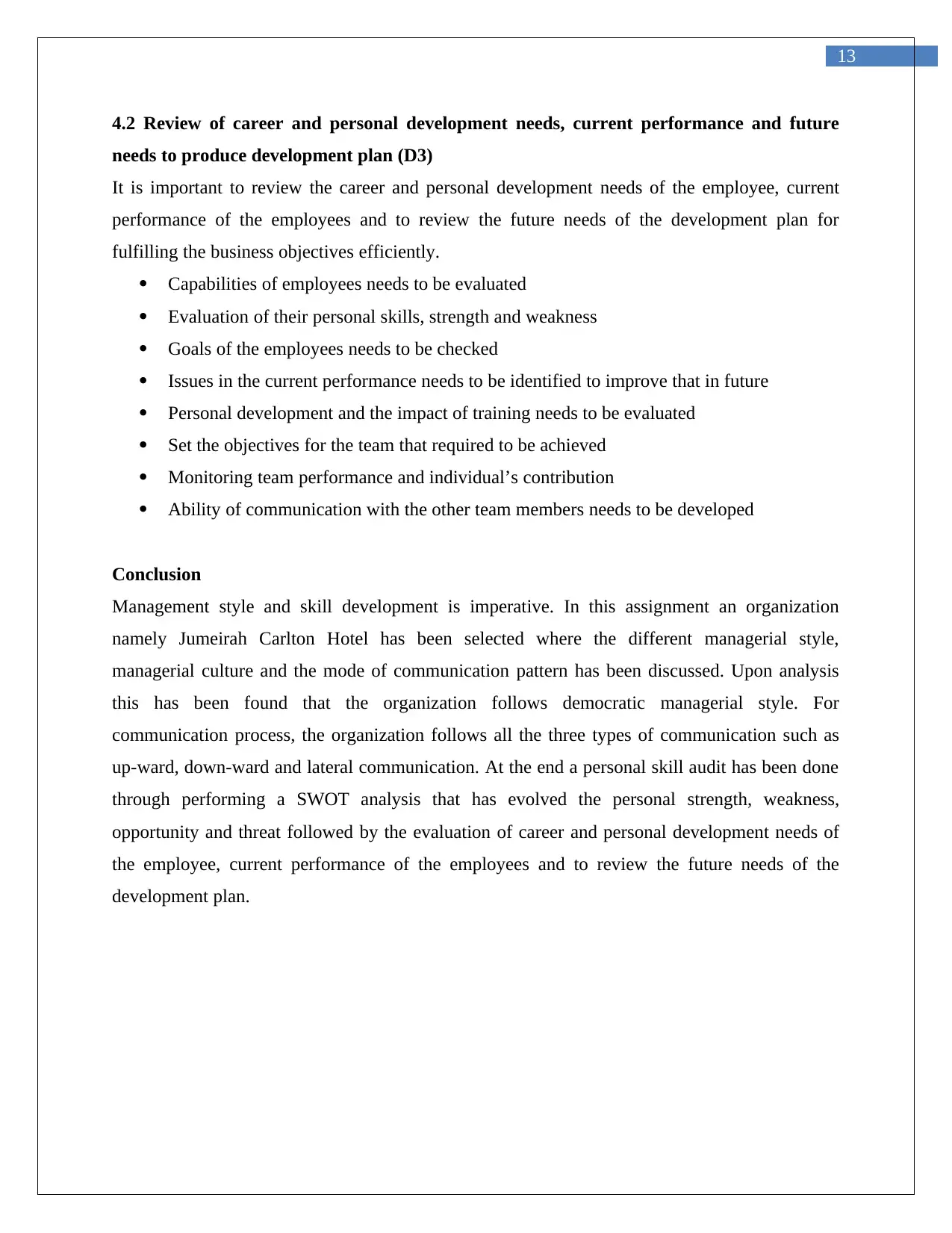
13
4.2 Review of career and personal development needs, current performance and future
needs to produce development plan (D3)
It is important to review the career and personal development needs of the employee, current
performance of the employees and to review the future needs of the development plan for
fulfilling the business objectives efficiently.
Capabilities of employees needs to be evaluated
Evaluation of their personal skills, strength and weakness
Goals of the employees needs to be checked
Issues in the current performance needs to be identified to improve that in future
Personal development and the impact of training needs to be evaluated
Set the objectives for the team that required to be achieved
Monitoring team performance and individual’s contribution
Ability of communication with the other team members needs to be developed
Conclusion
Management style and skill development is imperative. In this assignment an organization
namely Jumeirah Carlton Hotel has been selected where the different managerial style,
managerial culture and the mode of communication pattern has been discussed. Upon analysis
this has been found that the organization follows democratic managerial style. For
communication process, the organization follows all the three types of communication such as
up-ward, down-ward and lateral communication. At the end a personal skill audit has been done
through performing a SWOT analysis that has evolved the personal strength, weakness,
opportunity and threat followed by the evaluation of career and personal development needs of
the employee, current performance of the employees and to review the future needs of the
development plan.
4.2 Review of career and personal development needs, current performance and future
needs to produce development plan (D3)
It is important to review the career and personal development needs of the employee, current
performance of the employees and to review the future needs of the development plan for
fulfilling the business objectives efficiently.
Capabilities of employees needs to be evaluated
Evaluation of their personal skills, strength and weakness
Goals of the employees needs to be checked
Issues in the current performance needs to be identified to improve that in future
Personal development and the impact of training needs to be evaluated
Set the objectives for the team that required to be achieved
Monitoring team performance and individual’s contribution
Ability of communication with the other team members needs to be developed
Conclusion
Management style and skill development is imperative. In this assignment an organization
namely Jumeirah Carlton Hotel has been selected where the different managerial style,
managerial culture and the mode of communication pattern has been discussed. Upon analysis
this has been found that the organization follows democratic managerial style. For
communication process, the organization follows all the three types of communication such as
up-ward, down-ward and lateral communication. At the end a personal skill audit has been done
through performing a SWOT analysis that has evolved the personal strength, weakness,
opportunity and threat followed by the evaluation of career and personal development needs of
the employee, current performance of the employees and to review the future needs of the
development plan.
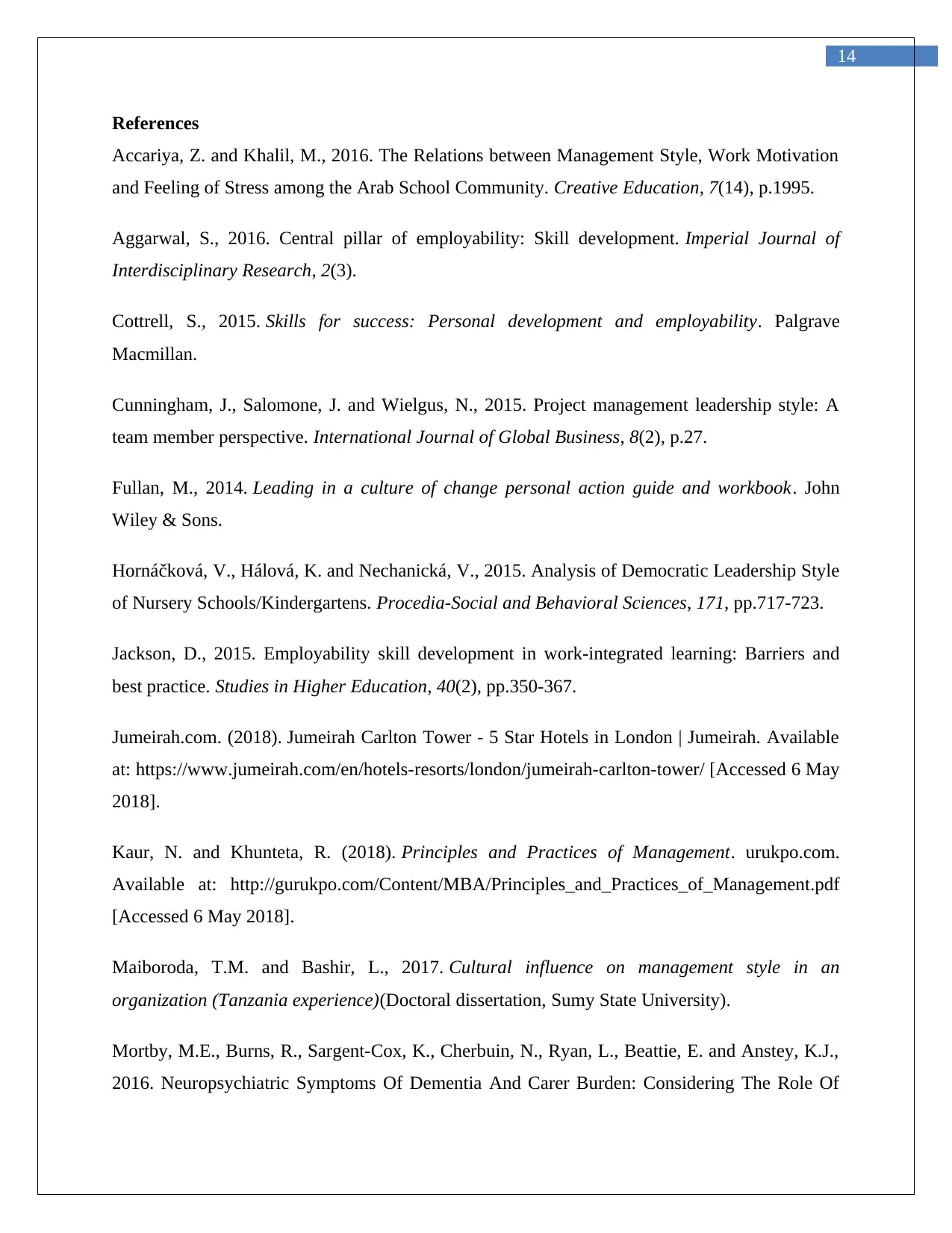
14
References
Accariya, Z. and Khalil, M., 2016. The Relations between Management Style, Work Motivation
and Feeling of Stress among the Arab School Community. Creative Education, 7(14), p.1995.
Aggarwal, S., 2016. Central pillar of employability: Skill development. Imperial Journal of
Interdisciplinary Research, 2(3).
Cottrell, S., 2015. Skills for success: Personal development and employability. Palgrave
Macmillan.
Cunningham, J., Salomone, J. and Wielgus, N., 2015. Project management leadership style: A
team member perspective. International Journal of Global Business, 8(2), p.27.
Fullan, M., 2014. Leading in a culture of change personal action guide and workbook. John
Wiley & Sons.
Hornáčková, V., Hálová, K. and Nechanická, V., 2015. Analysis of Democratic Leadership Style
of Nursery Schools/Kindergartens. Procedia-Social and Behavioral Sciences, 171, pp.717-723.
Jackson, D., 2015. Employability skill development in work-integrated learning: Barriers and
best practice. Studies in Higher Education, 40(2), pp.350-367.
Jumeirah.com. (2018). Jumeirah Carlton Tower - 5 Star Hotels in London | Jumeirah. Available
at: https://www.jumeirah.com/en/hotels-resorts/london/jumeirah-carlton-tower/ [Accessed 6 May
2018].
Kaur, N. and Khunteta, R. (2018). Principles and Practices of Management. urukpo.com.
Available at: http://gurukpo.com/Content/MBA/Principles_and_Practices_of_Management.pdf
[Accessed 6 May 2018].
Maiboroda, T.M. and Bashir, L., 2017. Cultural influence on management style in an
organization (Tanzania experience)(Doctoral dissertation, Sumy State University).
Mortby, M.E., Burns, R., Sargent-Cox, K., Cherbuin, N., Ryan, L., Beattie, E. and Anstey, K.J.,
2016. Neuropsychiatric Symptoms Of Dementia And Carer Burden: Considering The Role Of
References
Accariya, Z. and Khalil, M., 2016. The Relations between Management Style, Work Motivation
and Feeling of Stress among the Arab School Community. Creative Education, 7(14), p.1995.
Aggarwal, S., 2016. Central pillar of employability: Skill development. Imperial Journal of
Interdisciplinary Research, 2(3).
Cottrell, S., 2015. Skills for success: Personal development and employability. Palgrave
Macmillan.
Cunningham, J., Salomone, J. and Wielgus, N., 2015. Project management leadership style: A
team member perspective. International Journal of Global Business, 8(2), p.27.
Fullan, M., 2014. Leading in a culture of change personal action guide and workbook. John
Wiley & Sons.
Hornáčková, V., Hálová, K. and Nechanická, V., 2015. Analysis of Democratic Leadership Style
of Nursery Schools/Kindergartens. Procedia-Social and Behavioral Sciences, 171, pp.717-723.
Jackson, D., 2015. Employability skill development in work-integrated learning: Barriers and
best practice. Studies in Higher Education, 40(2), pp.350-367.
Jumeirah.com. (2018). Jumeirah Carlton Tower - 5 Star Hotels in London | Jumeirah. Available
at: https://www.jumeirah.com/en/hotels-resorts/london/jumeirah-carlton-tower/ [Accessed 6 May
2018].
Kaur, N. and Khunteta, R. (2018). Principles and Practices of Management. urukpo.com.
Available at: http://gurukpo.com/Content/MBA/Principles_and_Practices_of_Management.pdf
[Accessed 6 May 2018].
Maiboroda, T.M. and Bashir, L., 2017. Cultural influence on management style in an
organization (Tanzania experience)(Doctoral dissertation, Sumy State University).
Mortby, M.E., Burns, R., Sargent-Cox, K., Cherbuin, N., Ryan, L., Beattie, E. and Anstey, K.J.,
2016. Neuropsychiatric Symptoms Of Dementia And Carer Burden: Considering The Role Of
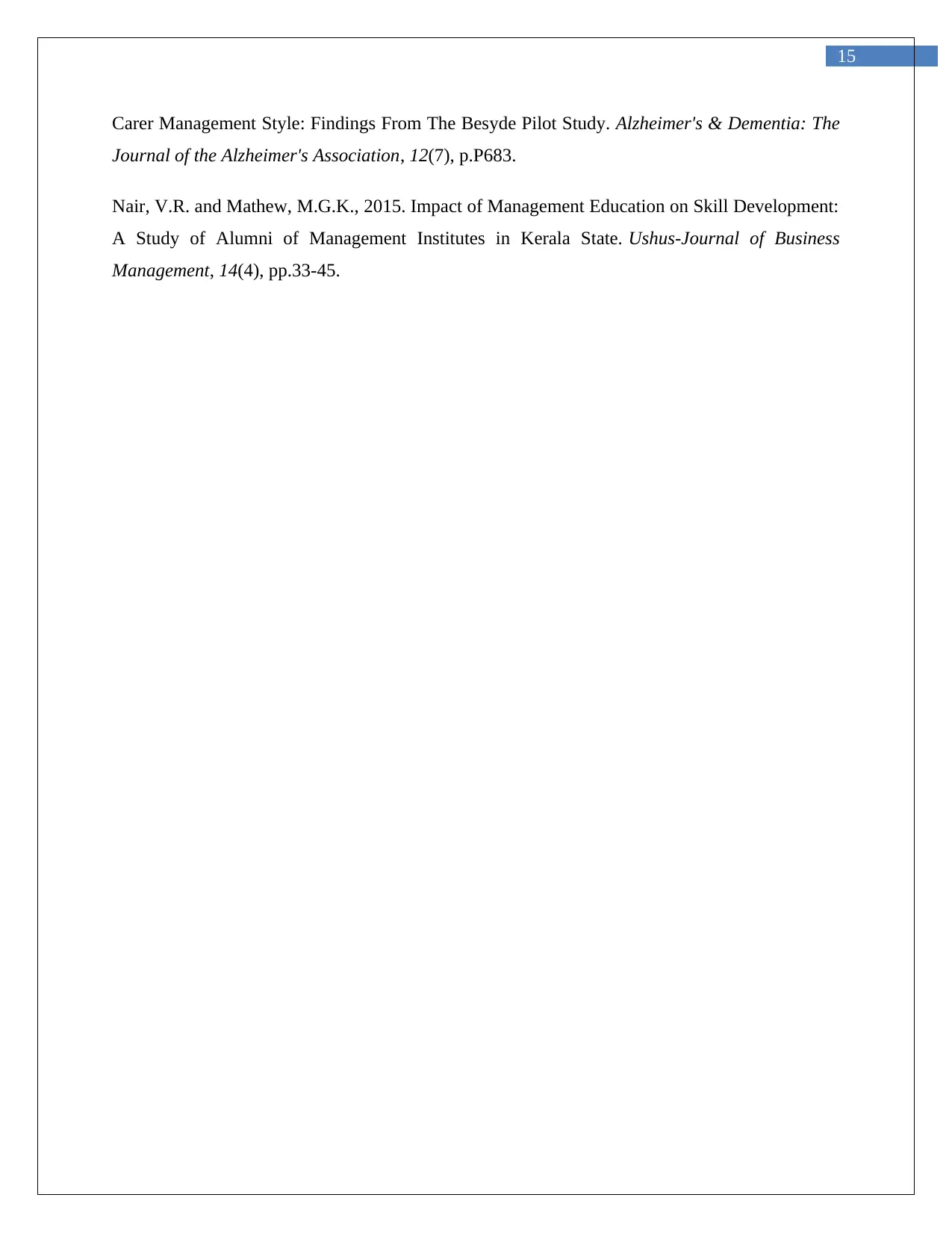
15
Carer Management Style: Findings From The Besyde Pilot Study. Alzheimer's & Dementia: The
Journal of the Alzheimer's Association, 12(7), p.P683.
Nair, V.R. and Mathew, M.G.K., 2015. Impact of Management Education on Skill Development:
A Study of Alumni of Management Institutes in Kerala State. Ushus-Journal of Business
Management, 14(4), pp.33-45.
Carer Management Style: Findings From The Besyde Pilot Study. Alzheimer's & Dementia: The
Journal of the Alzheimer's Association, 12(7), p.P683.
Nair, V.R. and Mathew, M.G.K., 2015. Impact of Management Education on Skill Development:
A Study of Alumni of Management Institutes in Kerala State. Ushus-Journal of Business
Management, 14(4), pp.33-45.
1 out of 16
Related Documents
Your All-in-One AI-Powered Toolkit for Academic Success.
+13062052269
info@desklib.com
Available 24*7 on WhatsApp / Email
![[object Object]](/_next/static/media/star-bottom.7253800d.svg)
Unlock your academic potential
© 2024 | Zucol Services PVT LTD | All rights reserved.





